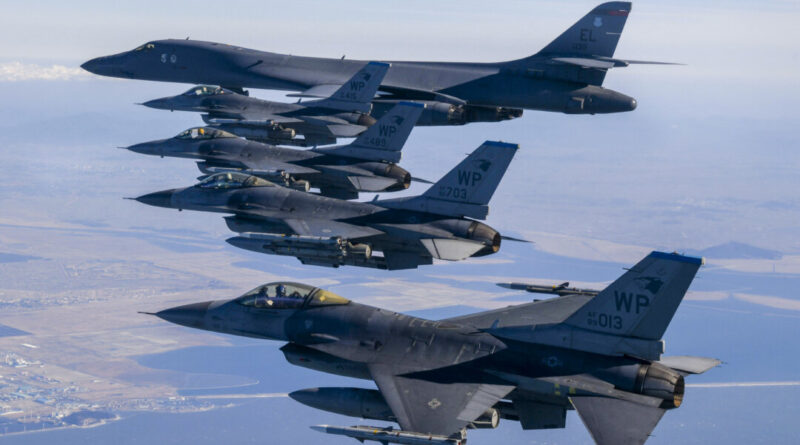Joint Military Exercises Conducted by US, South Korea, and Japan While North Korean Troops Engage in Training Activities with Russian Forces
The military drills are part of a trilateral exercise known as ‘Freedom Edge.’
The United States and Japan will participate in a three-day joint military exercise with South Korea starting from Nov. 13, as announced by military officials. This comes shortly after North Korea launched an intercontinental ballistic missile (ICBM) and reportedly confirmed a major defense pact with Russia.
Named “Freedom Edge,” this joint exercise will involve South Korean and Japanese fighter jets, maritime patrol aircraft, as well as the USS George Washington, USS Higgins, USS McCampbell, USS Dewey, F-35, F-18, P-8, and KC-135. The U.S. Indo–Pacific Command (USPACOM) mentioned this in a statement released on Nov. 12.
According to USPACOM, “Freedom Edge continues to demonstrate the defensive posture and unbreakable will of Japan, the ROK, and the U.S. to promote trilateral multi-domain interoperability and to protect freedom for peace and stability in the Indo-Pacific, including the Korean Peninsula.”
The exact location of the joint exercise on the Korean Peninsula was not specified by USPACOM.
This marks the second iteration of the joint training exercise, which was first conducted among the three partner nations in June. This decision was made in 2023 to enhance trilateral security cooperation in response to increasing threats from China and North Korea.
USPACOM mentioned that the latest iteration showcases “state-of-the-art air defense capabilities with the integration of 5th generation fighters into a sophisticated multi-domain defense infrastructure.”
“Their incorporation into complex Ballistic Missile Defense, Air Defense, Anti-Submarine Warfare, Anti-Surface Warfare, Maritime Interdiction, and Defensive Cyber trainings, ensures that their combined military and self-defense forces can operate together at the highest level against any threat,” as stated by USPACOM.
USPACOM further mentioned that the three nations will continue to collaborate closely to broaden their cooperation in a “complex security environment.”
North Korean Troops Training With Russian Soldiers
The U.S. State Department revealed on Nov. 12 that North Korean troops are now participating in combat operations alongside Russian forces amidst Russia’s ongoing invasion of Ukraine.
State Department spokesperson Vedant Patel informed reporters at a briefing that over 10,000 soldiers from North Korea have been deployed to eastern Russia, with most of them stationed in the far-western Kursk Oblast, where they have begun training with Russian forces.
Patel expressed concern about Russia relying on the DPRK (Democratic People’s Republic of Korea) for soldiers to continue their aggression against Ukraine. He also noted that the success of Russia’s battlefield operations using North Korean troops would depend on their integration into the Russian military, highlighting potential issues with interoperability, language barriers, command and control, and communications.
“The United States is closely consulting with our allies, partners, and other regional countries regarding the implications of these developments,” Patel stated.
Patel’s remarks came shortly after North Korea’s state-run media reported the ratification of a mutual defense treaty with Russia, initially signed by Russian President Vladimir Putin and North Korean leader Kim Jong Un in June.
This treaty includes a provision for both nations to provide immediate military assistance in case of an attack. Additionally, Russia and North Korea have agreed to collaborate in establishing a “just and multipolar new world order” and enhancing cooperation in various sectors such as peaceful atomic energy, space, food supply, trade, and the economy.
Vladimir Putin has not yet commented on the alleged ratification of this agreement.
Reuters and The Associated Press contributed to this report.





